
New Delhi: The Indian stock market outlook continues to remain positive given the strength of corporate balance sheets and the healthy rise in capital expenditure, according to Motilal Oswal Private Wealth.
The government proposes to increase capital expenditure outlay by 11.1 per cent to Rs 11.11 lakh crore in 2024-25. The substantial increase in capex is central to the government's efforts to enhance growth potential and job creation, crowd in private investments and provide a cushion against global headwinds.
A capital expenditure, or capex, is used to set up long-term physical or fixed assets.
Motilal Oswal Private Wealth's Temperature Gauge Index shows that large caps are in a fair valuation zone. Hence, for incremental allocation to equity, it suggests investing in lump-sum with a bias towards large cap and multicap strategies.
Over the last 12 months, the mid and small cap indices have significantly outperformed the large cap index (Nifty50).
While corporate earnings over the next couple of years are expected to remain steady, it would not be prudent to expect the pace of growth to be similar to the previous 4 years, it said in a note.
"Hence, there is a likelihood that the current valuations for the Mid and Small cap indices could witness a mean reversion," it said.
The markets regulator SEBI earlier this month raised concerns over stretched valuations of small and mid-cap. It is not appropriate to allow the froth to keep building, SEBI Chairperson Madhabi Puri Buch reportedly said on March 11.
Noting that the country's industrial landscape is poised to witness a significant transformation, it said India needs to address the persistent challenges of low labour productivity, high logistics and power costs, and a lack of the required innovation.
"The combination of government initiatives, private investments, and an increased focus on emerging sectors is setting the stage for a sustainable and resilient industrial growth story," it said.
It suggested that the pace of reforms needs to be sustained for India to join the global value chain and for the manufacturing sector to account for 20 per cent of GDP over the medium to long term.
Cumulatively, 2023 had been stellar for investors who parked their money in Indian stocks. Though there has been some turbulence, first during the Adani-Hindenburg episode and lately during the initial days of the Israel-Hamas war, the calendar year 2023 gave handsome monetary dividends to stock market investors.
In 2023, Sensex and Nifty gained 16-17 per cent, on a cumulative basis. They gained a mere 3 per cent each in the same period of 2022.
Firm GDP growth forecast, inflation at manageable levels, political stability at the central government level, and signs that the central banks world over are done with their monetary policy tightening have painted a bright picture for India - which many agencies have termed to be the fastest-growing major economy.
India's GDP grew at a massive 8.4 per cent during the October-December quarter of the current financial year 2023-24 and the country continued to remain the fastest-growing major economy.